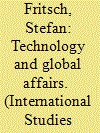|
|
|
Sort Order |
|
|
|
Items / Page
|
|
|
|
|
|
|
| Srl | Item |
| 1 |
ID:
140943


|
|
|
|
|
| Summary/Abstract |
When wars come to an end, even a decisive military victory does not necessarily translate into a decisive political outcome. Michael Clarke reflects on the nature of international warfare, systemic change, and the difficulties of defining with any clarity the outlines of ‘victory’ and ‘defeat’, especially in political terms.
|
|
|
|
|
|
|
|
|
|
|
|
|
|
|
|
| 2 |
ID:
102938


|
|
|
|
|
| Publication |
2011.
|
| Summary/Abstract |
Technology has always played an important role in global politics, economics, security, and culture. It has continuously shaped the structure of the global system, its actors, and the interactions between them and vice versa. However, theories of International Relations (IR), and in particular those of International Political Economy (IPE), have performed little to theoretically conceptualize technology as a powerful factor within explanations of change in global affairs. Although technology often is implicitly present in the theories of IR and IPE, it is often interpreted as an external, passive, apolitical, and residual factor. This essay argues that to develop a better understanding of transformation in global affairs, technology has to be integrated more systematically into the theoretical discussions of IR/IPE. Technology should be understood as a highly political and integral core component of the global system that shapes global affairs and itself is shaped by global economics, politics, and culture. This paper makes the case for an interdisciplinary approach, which systematically incorporates insights of Science and Technology Studies (S&TS) to provide a better understanding of how technology and the global system and politics interact with each other. In so doing, it opens the field to a richer understanding of how global systemic change is impacted by technology and how global politics, economics, and culture impact technological evolution.
|
|
|
|
|
|
|
|
|
|
|
|
|
|
|
|
| 3 |
ID:
158836


|
|
|
|
|
| Summary/Abstract |
I examine decentralization through the lens of the local dynamics it unleashed in Bangladesh. I argue that the national effects of decentralization are largely the sum of its local-level effects. Hence, to understand decentralization, we must first understand how local government works. This implies analysing not only decentralization, but also democracy, from the bottom up. I present a model of local government responsiveness as the product of political openness and substantive competition. The quality of politics, in turn, emerges endogenously as a joint product of the lobbying and political engagement of local firms/interests, and the organizational density and ability of civil society. I then test these ideas using qualitative data from Bangladesh. The evidence shows that civic organizations worked with non-governmental organizations and local governments to effect transformative change from the grass roots upwards—not just to public budgets and outputs, but to the underlying behaviours and ideas that underpin social development. In the aggregate, these effects were powerful. The result, key development indicators show, is Bangladesh leap-frogging past much wealthier India between 1990 and 2015.
|
|
|
|
|
|
|
|
|
|
|
|
|
|
|
|
| 4 |
ID:
101454


|
|
|
|
|
| Publication |
2010.
|
| Summary/Abstract |
Transitioning to low carbon communities requires an understanding of community practices and resultant emissions, as well as the technologies, infrastructures and institutions associated with and accessed by communities. Moreover, it requires an understanding of the connections between these integrated system components, its dynamics, a defined transition and potential 'levers' involved in 'transitioning'. This paper accepts the notion that 'levers' include programmes designed to achieve practice or behaviour change in households which result in less carbon intensive lifestyles, and focuses on the factors that shape human behaviour and influence householder energy consumption. Research to date by the authors and others indicates that a comprehensive socio-technical framework that considers both individual psychological factors as well as the systems, standards and norms under which individuals operate is fundamental to the development of successful strategies to shift towards low carbon communities.
A database has been compiled of over one hundred local programmes aimed at realising carbon neutral communities across Australia largely through approaches to behaviour change. This paper presents the findings of an analysis of these programmes, particularly with regard to the extent to which they take account of a socio-technical framework or understanding of domestic consumption behaviours and whether they are aware of or aim to influence changing standards and expectations around consumption practices within the home. While a number of exemplary community-based programmes adopt an integrated approach to addressing both technical and behavioural dimensions in the shift to low carbon communities, it was found that most fail to take sufficient account of the systems, standards and norms shaping consumption. Conclusions include directions for policy and programme design based on the study findings.
|
|
|
|
|
|
|
|
|
|
|
|
|
|
|
|
| 5 |
ID:
176313


|
|
|
|
|
| Summary/Abstract |
Since early June, I have been thinking about Chief of Naval Operations (CNO) Admiral Michael Gilday’s empathetic message on the death (murder) of George Floyd. “First, right now, I think we need to listen. We have black Americans in our Navy and in our communities that are in deep pain right now. They are hurting,” said the CNO. He continued, “I’ve received emails, and I know it’s not a good situation. I know that for many of them, they may not have somebody to talk to. I ask you to consider reaching out, have a cup of coffee, have lunch, and just listen.”1
|
|
|
|
|
|
|
|
|
|
|
|
|
|
|
|
|
|
|
|
|